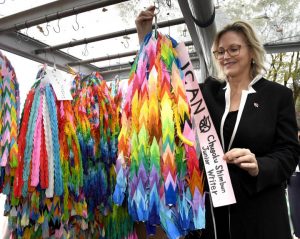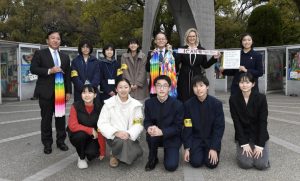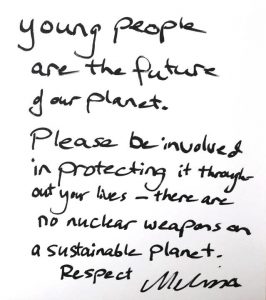Junior Writers Reporting: There are no nuclear weapons on a sustainable planet
Jan. 29, 2024
January 22, 2024, marked the third anniversary of the effectuation of the Treaty on the Prohibition of Nuclear Weapons (TPNW), which bans the production, possession and use of nuclear weapons. In time for the third anniversary, Melissa Parke, executive director of the International Campaign to Abolish Nuclear Weapons (ICAN), a non-governmental organization (NGO) that contributed to the establishment of the treaty, visited Hiroshima. She interacted with A-bomb survivors and citizens, and toured the Hiroshima Peace Memorial Museum. How did she feel being in the A-bombed city of Hiroshima? What kinds of expectations does she have for young people? The Chugoku Shimbun’s junior writers interviewed her.
“Young people are the future of our planet”
“Be involved in protecting our planet throughout your lives”
Ms. Parke, who arrived in Hiroshima City on January 19, offered flowers at the Cenotaph for the A-bomb Victims at Hiroshima Peace Memorial Park (in the city’s Naka Ward), along with Akira Kawasaki, a member of the ICAN international steering committee, and visited the Children’s Peace Monument.
We, junior writers, welcomed them in front of the Children’s Peace Monument and handed them a thousand paper cranes we folded for the day and another one thousand paper cranes folded by citizens and entrusted to us. Ms. Parke went to a booth for paper cranes and placed the folded paper cranes in the booth with great care.
We then asked Ms. Parke in English to give us her message for young people to realize nuclear abolition and to write that message on a large square card as well.
She wrote her message in English, filling in the space on the card with: “Young people are the future of our planet. Please be involved in protecting it throughout your lives—there are no nuclear weapons on a sustainable planet.” She also said we must never forget what happened in Hiroshima and to make sure it never happens again.
We would like to learn lessons from war through our activities as junior writers and send out messages so young generations can perceive the A-bomb experiences and memories of war as their own problems. We have renewed our resolve.
Lecture at Hiroshima Peace Memorial Museum
On January 20, there was a lecture meeting by Ms. Parke at the Hiroshima Peace Memorial Museum. She expressed her gratitude to A-bomb survivors: “We are all deeply indebted to the hibakusha who by sharing their personal testimonies, time and again, have courageously spread a simple but profound message to the world, that humanity and nuclear weapons cannot coexist.” She also spoke about the importance of younger generations carrying on the efforts to communicate A-bomb experiences.
At the moment, 70 nations and regions have participated in the TPNW and more than 20 nations and regions have completed the first procedure of “signing the treaty” for joining it. ICAN, in solidarity with nations showing a positive attitude toward the treaty, is channeling its efforts into calling for increasing the number of the signatory nations.
But Japan says protection by U.S. nuclear weapons is necessary for Japan’s national security. Ms. Parke said she was “disappointed Japan has not yet joined” the treaty and called for Japan’s participation, adding it was not too late yet to join.
Of course, nuclear abolition is a difficult goal to achieve. Ms. Parke stressed it was important to cooperate with a variety of people and to continue our efforts even though we might feel discouraged during our activities.
During her lecture, Ms. Parke touched on what she felt during her visit to the Hiroshima Peace Memorial Museum. She said she learned human beings were capable of inflicting such great harm on fellow human beings, and that we must never repeat the tragedy. In speaking to the audience, she also said we humans always had a choice, and that we could create a better society and a better future by seeking understanding rather than confrontation, by engaging in dialogue rather than war, and by making art and music rather than bombs.
Expectations for young people: Act at the local level
Ms. Parke worked as a member of the Australian Parliament for nine years in Australia and also served as an Australian government minister. Before that, as a U.N. legal expert, she took a post in Gaza in the Palestinian autonomous region, now under attack from Israeli forces, and in Kosovo in former Yugoslavia, where conflicts erupted in the 1990s.
Following her lecture, Ms. Parke joined a panel discussion with an A-bomb survivor and young people. In response to a question about how her high school life was, she reflected back on her high school days and answered she had been concerned about the world situation, human rights, and environmental issues and had always wondered what she could do to make the world better. She then said, “Whatever you do for the world, we have to do it at local level,” and “We help local, we also help global.”
Junior writers asked Ms. Parke what kinds of actions young people should take for Japan’s participation in the TPNW. Ms. Parke encouraged us to directly call on Japan’s Prime Minister Fumio Kishida, saying the voices of young people in Hiroshima are really powerful. She also advised to expand the circle of people by joining hands with young people in other parts of Japan and the world who are taking action for nuclear abolition.
ICAN accomplished its goal of establishing the treaty only ten years after it’s founding and received the Noble Peace Prize in 2017. We have keenly realized that her words “You are the agency, you can make changes yourselves ... small actions by lots of people end up to something big” are true.
The above article was written by the following junior writers:
Yuno Nakashima, 17; Mei Kobayashi, 17; Shino Taguchi, 17; Riko Soma, 16; Sakura Tanimura, 15; Karin Fujiwara, 16; Mayu Yoshida, 16; Natsumi Ozeki, 15; Meika Kawamoto, 15; Miu Toda, 15; Natsuki Yamashiro, 15; Gaku Kawanabe, 14; Mai Nishitani, 14; Haruki Yukitomo, 14; Ayako Yamashita, 13.
(Originally published on January 29, 2024)
On the third anniversary of TPNW’s entry into force, ICAN executive director visits Hiroshima
In front of the Children's Peace Monument, Parke says, “We must never forget what happened here”
“Young people are the future of our planet”
“Be involved in protecting our planet throughout your lives”
Ms. Parke, who arrived in Hiroshima City on January 19, offered flowers at the Cenotaph for the A-bomb Victims at Hiroshima Peace Memorial Park (in the city’s Naka Ward), along with Akira Kawasaki, a member of the ICAN international steering committee, and visited the Children’s Peace Monument.
We, junior writers, welcomed them in front of the Children’s Peace Monument and handed them a thousand paper cranes we folded for the day and another one thousand paper cranes folded by citizens and entrusted to us. Ms. Parke went to a booth for paper cranes and placed the folded paper cranes in the booth with great care.
We then asked Ms. Parke in English to give us her message for young people to realize nuclear abolition and to write that message on a large square card as well.
She wrote her message in English, filling in the space on the card with: “Young people are the future of our planet. Please be involved in protecting it throughout your lives—there are no nuclear weapons on a sustainable planet.” She also said we must never forget what happened in Hiroshima and to make sure it never happens again.
We would like to learn lessons from war through our activities as junior writers and send out messages so young generations can perceive the A-bomb experiences and memories of war as their own problems. We have renewed our resolve.
Not too late for Japan to participate in TPNW
Lecture at Hiroshima Peace Memorial Museum
On January 20, there was a lecture meeting by Ms. Parke at the Hiroshima Peace Memorial Museum. She expressed her gratitude to A-bomb survivors: “We are all deeply indebted to the hibakusha who by sharing their personal testimonies, time and again, have courageously spread a simple but profound message to the world, that humanity and nuclear weapons cannot coexist.” She also spoke about the importance of younger generations carrying on the efforts to communicate A-bomb experiences.
At the moment, 70 nations and regions have participated in the TPNW and more than 20 nations and regions have completed the first procedure of “signing the treaty” for joining it. ICAN, in solidarity with nations showing a positive attitude toward the treaty, is channeling its efforts into calling for increasing the number of the signatory nations.
But Japan says protection by U.S. nuclear weapons is necessary for Japan’s national security. Ms. Parke said she was “disappointed Japan has not yet joined” the treaty and called for Japan’s participation, adding it was not too late yet to join.
Of course, nuclear abolition is a difficult goal to achieve. Ms. Parke stressed it was important to cooperate with a variety of people and to continue our efforts even though we might feel discouraged during our activities.
During her lecture, Ms. Parke touched on what she felt during her visit to the Hiroshima Peace Memorial Museum. She said she learned human beings were capable of inflicting such great harm on fellow human beings, and that we must never repeat the tragedy. In speaking to the audience, she also said we humans always had a choice, and that we could create a better society and a better future by seeking understanding rather than confrontation, by engaging in dialogue rather than war, and by making art and music rather than bombs.
Expectations for young people: Act at the local level
Ms. Parke worked as a member of the Australian Parliament for nine years in Australia and also served as an Australian government minister. Before that, as a U.N. legal expert, she took a post in Gaza in the Palestinian autonomous region, now under attack from Israeli forces, and in Kosovo in former Yugoslavia, where conflicts erupted in the 1990s.
Following her lecture, Ms. Parke joined a panel discussion with an A-bomb survivor and young people. In response to a question about how her high school life was, she reflected back on her high school days and answered she had been concerned about the world situation, human rights, and environmental issues and had always wondered what she could do to make the world better. She then said, “Whatever you do for the world, we have to do it at local level,” and “We help local, we also help global.”
Junior writers asked Ms. Parke what kinds of actions young people should take for Japan’s participation in the TPNW. Ms. Parke encouraged us to directly call on Japan’s Prime Minister Fumio Kishida, saying the voices of young people in Hiroshima are really powerful. She also advised to expand the circle of people by joining hands with young people in other parts of Japan and the world who are taking action for nuclear abolition.
ICAN accomplished its goal of establishing the treaty only ten years after it’s founding and received the Noble Peace Prize in 2017. We have keenly realized that her words “You are the agency, you can make changes yourselves ... small actions by lots of people end up to something big” are true.
The above article was written by the following junior writers:
Yuno Nakashima, 17; Mei Kobayashi, 17; Shino Taguchi, 17; Riko Soma, 16; Sakura Tanimura, 15; Karin Fujiwara, 16; Mayu Yoshida, 16; Natsumi Ozeki, 15; Meika Kawamoto, 15; Miu Toda, 15; Natsuki Yamashiro, 15; Gaku Kawanabe, 14; Mai Nishitani, 14; Haruki Yukitomo, 14; Ayako Yamashita, 13.
(Originally published on January 29, 2024)










